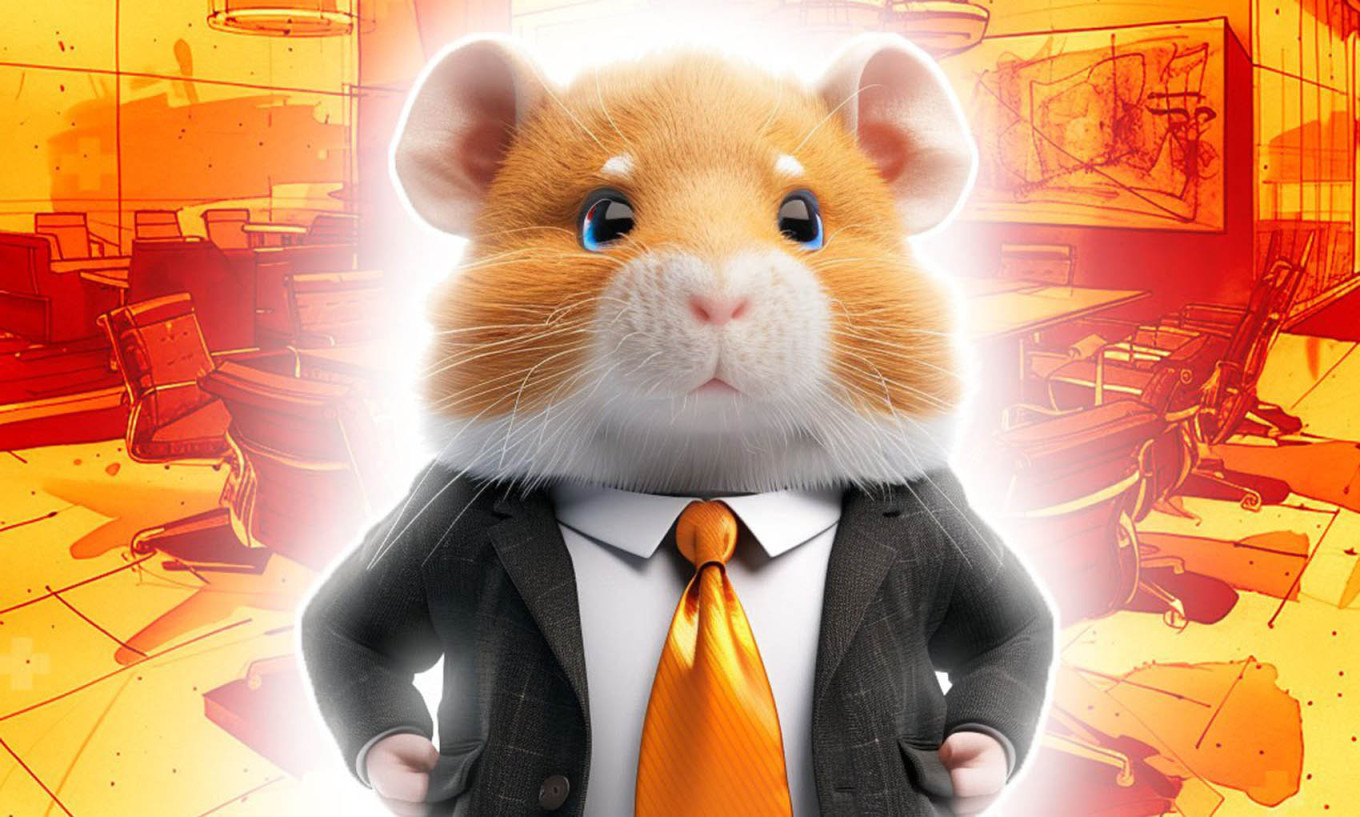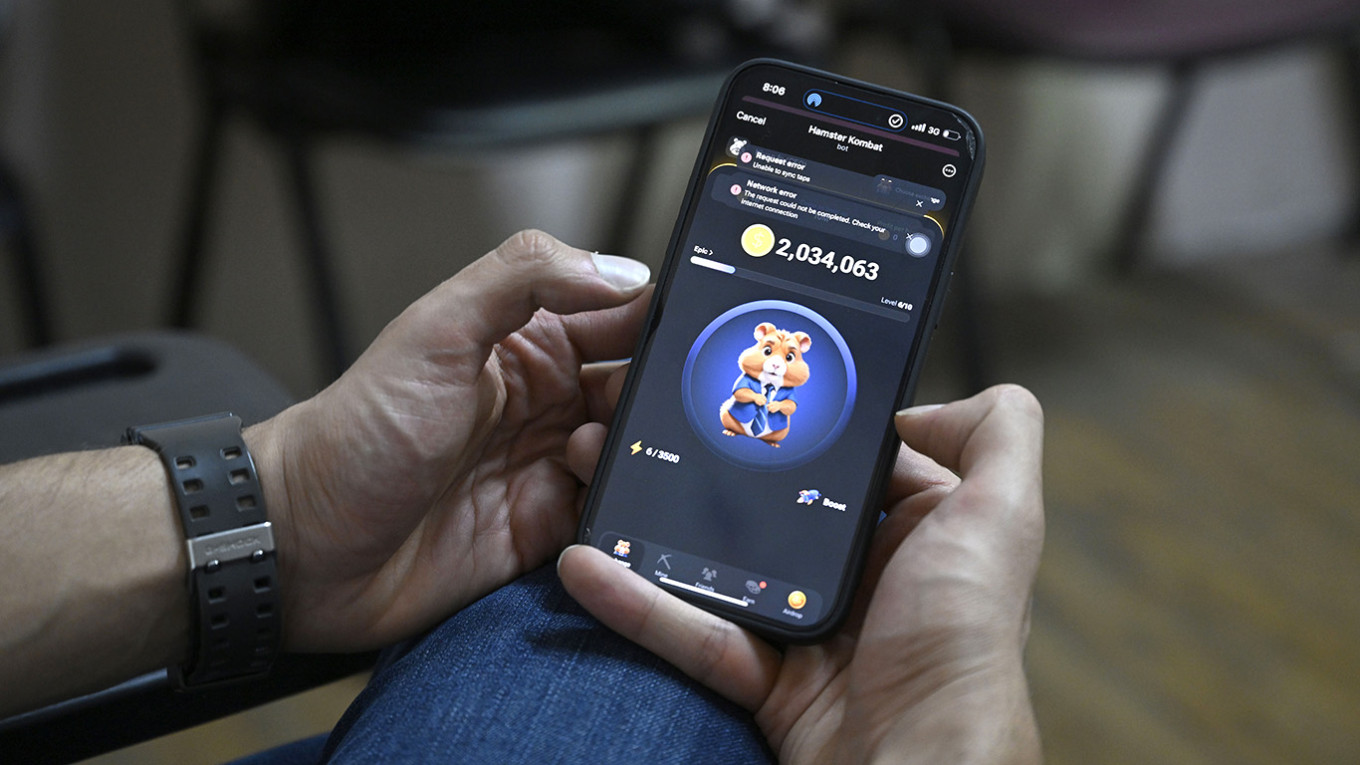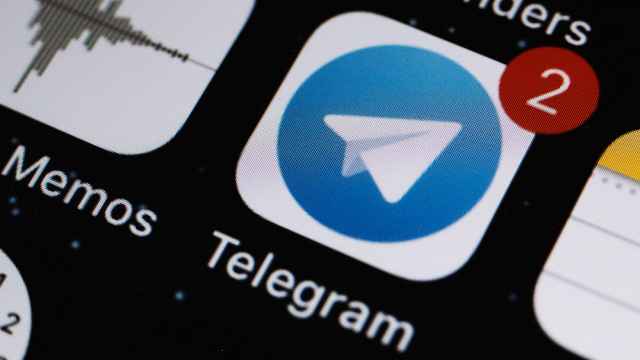Clicker Telegram mini-games, where players generate virtual currency by tapping their phone screens, have gone viral on the Russian-speaking internet.
The largest of these, Hamster Kombat, claims to have amassed 200 million users in just a few weeks and runs the world’s largest Telegram channel. Its growing popularity has sparked concerns from both Russian and Ukrainian authorities.
Here's everything you need to know about this wildly popular game.
What is Hamster Kombat and how does it work?
Launched in March as a bot on the popular messenger Telegram, Hamster Kombat revolves around tapping on the image of a hamster to earn in-game rewards.
Players take on the role of the CEO of a cryptocurrency exchange, working to upgrade their business.
The more you tap, the more points you earn, allowing your character to level up.
Much of the hype surrounding the game stems from the expectation that its in-game tokens will eventually be converted into real-value cryptocurrencies and distributed to players.
The launch of the game’s cryptocurrency is scheduled for July, but the exact date is unknown. How much these coins will be worth and how they will be distributed to players have also not been specified.
“I don’t have any concrete expectations, but I hope to make at least some profit out of it,” Andrei, 34, a video editor from St. Petersburg who has been playing the game every day for about a month, told The Moscow Times.
It is unclear who is behind the game, but an investigation by the independent media outlet The Bell revealed that one of its founders is Eduard Gurinovich, a Russian IT entrepreneur and founder of CarPrice, an online auction platform for used cars.
The Bell’s sources also indicated that the game has ties to Telegram and its founder Pavel Durov.
The game’s Russian origins are further highlighted by its use of the term “hamster,” a Russian slang word for an inexperienced investor who impulsively follows the latest trends.
“The game’s developers have a genius sense of humor,” says Yevgeny, 30, a popular Russian YouTuber and gamer. “Essentially, they made a game about hamsters for hamsters.”
Social media hype
Hamster Kombat has gained impressive traction on social media in the few months since its launch.
The game boasts the world’s largest Telegram channel with over 45 million subscribers. It has also amassed over 9.5 million followers on X (formerly Twitter) and more than 27 million subscribers on YouTube.
Hamster Kombat went particularly viral in Russia, where its popularity spiked dramatically in June, according to Google Trends.
“If my regular videos would typically get about 10,000 to 30,000 views, videos about Hamster Kombat would easily reach 200,000 or 300,000,” explains YouTuber Yevgeny, who recently launched a dedicated channel focused entirely on Hamster Kombat.
In his videos, he explains how to maximize rewards by using special cards and completing various mini-tasks within the game.

Influencers like Yevgeny have been attracting new users to the game through referral links, earning additional in-game rewards through the game’s referral program.
“In eight days, I invited about 20,000 people to the game,” said Yevgeny. “I reached the top level of the game and became one of the top 100 gamers in the world.”
The Notcoin success story
Hamster Kombat is part of a growing trend of "click-to-earn" Telegram games that began with Notcoin, a mini-game endorsed by Telegram founder Durov that launched in January. Notcoin players had to click on a golden coin icon to earn points.
In May, Notcoin successfully launched a cryptocurrency, NOT, on The Open Network, a blockchain platform affiliated with Telegram. Players who had accumulated points could collect rewards in the form of NOT that, depending on their performance, could amount to several hundred dollars. Since then, the NOT cryptocurrency has surged in value.
“People saw that it was actually possible to get something from the game and they got into it en masse,” says Yevgeny. “Everybody loves free stuff.”
‘Super app’
One key to the popularity of clicker games like Toncoin and Hamster Kombat is their seamless integration into Telegram, leveraging the app's vast user base of nearly 1 billion users.
As Bloomberg reported, these games can serve as an easy entry point for Telegram users into the world of cryptocurrencies. Sources told The Bell the game also serves as a booster for the TON blockchain ecosystem, which recently launched its own dating service.
“It’s for every user. You don’t need to be familiar with cryptocurrency — you just tap on the screen, and that’s it,” explains Ilya Astashenkov, 20, a TON blockchain community manager who claimed to have earned about $500 by playing Notcoin.
“I wasn’t familiar with cryptocurrencies and didn’t consider them a trustworthy investment,” says Sergei Aleksandrov, 34, another Hamster Kombat player from St. Petersburg. “But I became interested in them through this game [Hamster Kombat].”
Hamster Kombat is designed to capture as much of the player's attention as possible. It drives more traffic “than Yandex and VK combined” which is how it generates revenue, a source told The Bell.
This game seems to be part of a broader initiative to position Telegram as a competitor to the Apple and Google stores, aiming to transform it into a “super app” similar to China’s WeChat, which integrates functionalities like games, payments and messaging into a single platform.
Concerns
Given its explosive popularity, particularly on the Russian-speaking internet, Russian authorities have warned of potential risks.
"Developers can close the project at any time, and then all virtual 'earnings' will be lost," warned State Duma deputy Sergei Gavrilov.
Anton Tkachev, deputy chairman of the State Duma’s Information Policy Committee, cautioned that “It’s not possible to earn large amounts of money in such a simple way” and advised people to “treat it like a regular game and save your time.”
Experts from Russian cybersecurity firm F.A.C.C.T. have highlighted concerns about rising scams associated with the game, which often target users to steal funds from Telegram's internal crypto wallet.
In Ukraine, where Hamster Kombat has also garnered a large audience, the game's alleged Russian roots have sparked concerns.
The Ukrainian state Center for Strategic Communications (StratcomCentreUA) said that the game, due to its apparent links to Russia, could potentially be used to collect users' personal data and share it with Russian authorities.
While the game doesn't require an initial investment, critics argue it employs manipulative tactics to maintain user engagement.
“The risk of direct financial loss for players may not be high since they’re not purchasing anything,” explains Ogle, a pseudonymous detective specializing in uncovering crypto-related scams. However, he noted that “money isn’t necessarily the most valuable commodity in our lives — time is.”
It is unclear whether Hamster Kombat will be able to replicate the success of Notcoin and whether this "click-to-earn" gaming model is sustainable in the long term.
Some experts argue that because the games lack intrinsic value beyond speculation, interest could quickly decline once users redeem their rewards.
"I doubt it will stick around; the game isn’t interesting per se,” says Andrei, the video editor from St. Petersburg who plans to sell his crypto rewards for hard currency when and if he collects them. "It's about making a profit without any upfront investment, that’s all.”
A Message from The Moscow Times:
Dear readers,
We are facing unprecedented challenges. Russia's Prosecutor General's Office has designated The Moscow Times as an "undesirable" organization, criminalizing our work and putting our staff at risk of prosecution. This follows our earlier unjust labeling as a "foreign agent."
These actions are direct attempts to silence independent journalism in Russia. The authorities claim our work "discredits the decisions of the Russian leadership." We see things differently: we strive to provide accurate, unbiased reporting on Russia.
We, the journalists of The Moscow Times, refuse to be silenced. But to continue our work, we need your help.
Your support, no matter how small, makes a world of difference. If you can, please support us monthly starting from just $2. It's quick to set up, and every contribution makes a significant impact.
By supporting The Moscow Times, you're defending open, independent journalism in the face of repression. Thank you for standing with us.
Remind me later.







